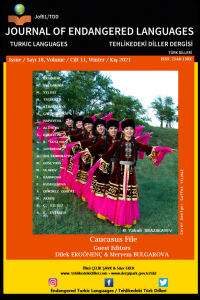Трагические Страницы Истории Карачаевцев И Балкарцев, Отразившиеся На Развитии Родного Языка И Проблемы Сохранения Современного Карачаево-Балкарского Языка
Öz
Сохранение языков народов России на государственном уровне сегодня актуально не только для самих народов, но и для всего человечества: потеря языкового генофонда означает безвозвратную утрату уникального исторического, антропологического, этнографического и культурного информационного блока научной картины мира. Разрушение природного многообразия культур, в основе которых лежат этнические различия – язык, самобытность, духовное богатство народа – ведет к разрушению всеобщего равновесия. В статье приводятся трагические страницы истории депортации, оставившей глубокий след в памяти народа, его сознании и психологии, до сих пор отражающихся на развитии родного языка, обосновывается факт невозможности развития родного языка вне условий компактного проживания этноса, территориальной целостности и государственности, налаженной системы образования и культуры. Депортация карачаевцев и балкарцев в Среднюю Азию и Казахстан не только лишила условий для развития родного языка, но и отбросила его вспять на несколько десятилетий. В исследовании предлагаются меры по восстановлению утраченных ресурсов родного языка и дальнейшему сохранению и развитию родного языка в рамках специальной Программы.
Anahtar Kelimeler
депортация народ родной язык культура лингвоцид духовно-нравственное наследие витальность языка языковая политика языковое строительство национальное самосознание национальное достоинство сохранение и развитие языка специальная программа развития языка поддержка государства
Kaynakça
- ГРИГОРЬЕВА Т.П. (1979). Японская художественная традиция. М., С. 19.
- МАРЕМШАОВА И.И. (2002). Эволюция этнического сознания карачаево-балкарского народа. Дисс. на соискание ученой степени доктора исторических наук, Махачкала.http://dereksiz.org/dissertaciya-na-soiskanie-uchenoj-stepeni-doktora-istoricheski.html
- ПЕТРЕНКО Д.А., Штайн К.Э. (2017). Лингвистическая палеонтология культуры: Языкознание, Кавказоведение. Ростов-на-Дону: ИП К.Р. Попов («Полиграф-Сервис»). 462 с.
- Письменные языки мира: Российская Федерация. Социолингвистическая энциклопедия (2000). Отв. ред. В. Ю. Михальченко, В. М. Солнцев. Москва. 651 с. СИНЕЛЬНИКОВ М. (2016). Седой водопад. -Газета «Карачай», №98 от17.12. 2016г.
- ЭФЕНДИЕВ Ф.С. (1999). Этнокультура и национальное самосознание. Нальчик: «Эль – Фа».329 с. Электронные ресурсы https://refdb.ru/look/1095576-p10.html
The Tragic Pages Of History Of The Karachai And Balkars, Reflected On The Development Of The Native Language And The Problems Of Preserving The Modern Karachay-Balkar Language
Öz
Preservation of the languages of the peoples of Russia at the state level is now relevant not only for the peoples themselves, but also for all mankind: the loss of the linguistic gene pool means the irretrievable loss of the unique historical, anthropological, ethnographic and cultural information block of the scientific picture of the world. The destruction of the natural diversity of cultures based on ethnic differences - language, identity, spiritual wealth of the people - leads to the destruction of the general balance. The article cites the tragic pages of the history of deportation, which left a deep mark on the memory of the people, their consciousness and psychology, which are still reflected in the development of the native language, the fact that it is impossible to develop the native language outside the conditions of compact residence of the ethnic group, territorial integrity and statehood, established education and culture.
The deportation of Karachayevs and Balkars to Central Asia and Kazakhstan not only deprived the conditions for the development of the native language, but also pushed it back for several decades. The study proposes measures to restore the lost resources of the native language and further preserve and develop the native language under the special program.
Anahtar Kelimeler
deportation people native language culture linguind spiritual and moral heritage vitality of language language policy language construction national identity national dignity preservation and development of the language special language development program support of the state
Kaynakça
- ГРИГОРЬЕВА Т.П. (1979). Японская художественная традиция. М., С. 19.
- МАРЕМШАОВА И.И. (2002). Эволюция этнического сознания карачаево-балкарского народа. Дисс. на соискание ученой степени доктора исторических наук, Махачкала.http://dereksiz.org/dissertaciya-na-soiskanie-uchenoj-stepeni-doktora-istoricheski.html
- ПЕТРЕНКО Д.А., Штайн К.Э. (2017). Лингвистическая палеонтология культуры: Языкознание, Кавказоведение. Ростов-на-Дону: ИП К.Р. Попов («Полиграф-Сервис»). 462 с.
- Письменные языки мира: Российская Федерация. Социолингвистическая энциклопедия (2000). Отв. ред. В. Ю. Михальченко, В. М. Солнцев. Москва. 651 с. СИНЕЛЬНИКОВ М. (2016). Седой водопад. -Газета «Карачай», №98 от17.12. 2016г.
- ЭФЕНДИЕВ Ф.С. (1999). Этнокультура и национальное самосознание. Нальчик: «Эль – Фа».329 с. Электронные ресурсы https://refdb.ru/look/1095576-p10.html
Ayrıntılar
| Birincil Dil | Türkçe |
|---|---|
| Konular | Dilbilim |
| Bölüm | Makaleler |
| Yazarlar | |
| Yayımlanma Tarihi | 28 Ocak 2021 |
| Gönderilme Tarihi | 22 Ağustos 2020 |
| Yayımlandığı Sayı | Yıl 2021 Cilt: 11 Sayı: 18 |



